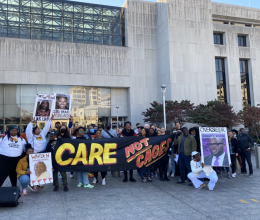In July 2015 we joined with National ACLU and the Electronic Frontier Foundation in filing an amicus brief in the D.C. Circuit supporting disclosure, under the Freedom of Information Act, of the Department of Justice’s “Federal Criminal Discovery Blue Book,” a manual distributed to all federal prosecutors and their paralegals instructing them on how to comply with their constitutional and other discovery obligations in criminal cases. We argued that the Blue Book contained “working law” – “binding agency opinions and interpretations that the agency actually applies in cases before it,” and as such must be released.
In July 2016, the court disagreed, accepting the government’s argument that the entire Blue Book was exempt from FOIA under the “attorney work product privilege,” which protects lawyers’ mental processes from disclosure. But in an unusual development, the court reconsidered in response to the plaintiff’s petition for rehearing. The court issued an amended decision in December 2016, concluding that the Blue Book might contain some material that is not exempt from FOIA. The court therefore sent the case back to the district court to figure out if there is any information that can be released.



